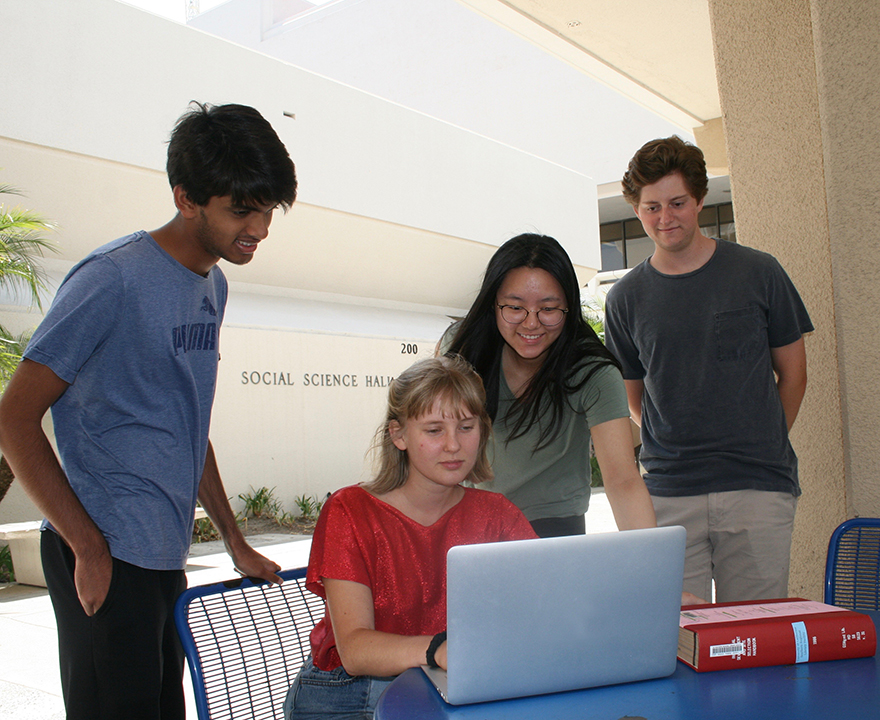In social sciences, summer is not for slacking

In social sciences, summer is not for slacking
- September 14, 2018
- From classes to research to internships and work, many students in social sciences spent their summer at school
Let’s face it: Being a student can be hard. For many, summer break offers a respite from courses, homework, and rushing down Ring Road to class. But doing work that isn’t required can give students an edge in post-grad life, and for some, the summer provides a great chance to go the extra mile. UCI’s School of Social Sciences offers many such opportunities from summer classes to jobs to research programs for those noble enough to spend their summer working in windowless rooms on campus instead of at the beach.
The School of Social Sciences offered 34 classes throughout the summer sessions for students who wanted to get ahead on their regular coursework before the next school year. Other students remained on campus to work or participate in programs the department offered. Student employees in the offices of Social Sciences earn income to help them support themselves. Meanwhile, the school’s programs provide opportunities to do intensive research and work closely with faculty, which is not always possible during the school year.
Students like Karla Melendez, a fifth year environmental engineering major, worked summer jobs at the School of Social Sciences as a way to earn money while she has has more free time. Melendez spent 20 hours a week working at the Instructional Support Center, providing support for grading and copy machines, organizing the mailroom, and delivering packages.
Financial aid was not available to her during the summer, so when her friend told her there were openings at the copy center, she applied for the job in order to pay her rent and gain work experience. Working on campus was the best option for her because she lived close by and didn’t have a car. She plans to continue the same job next year as she enjoys the people she met while working there.
“They are really nice and it helps with networking and talking with TAs and faculty,” says Melendez.
Melendez’s supervisor Craig Stone, who oversees the Instructional Support Center, says that hiring students is mutually beneficial for the students and the department. The federal work-study program helps pay a portion of eligible students’ salaries while students gain experience and interact in an environment with faculty.
“I think it makes it seem more like a mentoring environment. If it was just staff that worked here, I don’t know that it would have that same aspect,” says Stone.
Other summer activities available to students in the Social Sciences range from the Program in Corporate Welfare to internships at the Ethics Center to the Summer Academic Enrichment Program. Through these programs students conduct research, develop skills they might not learn in their regular classes, and have opportunities to interact more closely with faculty.
The Summer Academic Enrichment Program, led by the school’s Student Services Director Teresa Neighbors, works to encourage first generation and low-income UCI students to pursue their master’s and doctorate degrees after graduation.
“Most of our students don’t think that they’re Ph.D. material, so we want to show them, yes, you are Ph.D. material,” says Neighbors. “You can be competitive and get into a grad school, and we think you should do this so that you can help improve things in society.”
The 18 students in the program lived on campus working closely together for its duration to prepare them for a graduate cohort experience. They worked in groups and individually to learn to conduct research, read and analyze material, and communicate and collaborate effectively. The program also placed emphasis on ensuring that students stayed connected to their identities, where they come from, and how they might use the skills they learn at UCI to uplift their own communities.
In addition to the Summer Academic Enrichment Program, the Program in Corporate Welfare, led by economics professor Amihai Glazer, offers both undergraduate and high school students opportunities to pursue research on how government policies impact corporations.
Of the 19 students in the program this summer, 11 were undergraduates and 8 were high school juniors and seniors. The students worked in teams gaining first-hand experience conducting research in the field of economics, took a course on statistics software, and attended lectures by guest speakers from the business world.
Olivia Miller, a Junior at Middlebury College and participant in the Program in Corporate Welfare, says she joined the program because of her love of learning.
“I got out of school in late May, and this project didn't begin until late June,” Miller says. “I spent most of my month off at the beach, and I have to say, I missed learning. The beach wasn't intellectually stimulating, it wasn't challenging, it wasn't enriching.”
Glazer, like other faculty members, says he enjoyed watching students grow and benefit from the school programs this summer. “It was wonderful. They’re articulate, hardworking, creative.”
And their efforts this summer will pay dividends for quite some time.
-Elyse Joseph and Helena Carlson, UC Irvine School of Social Sciences
-pictured: Student interns in UCI's Corporate Welfare summer program
Share on:


connect with us: